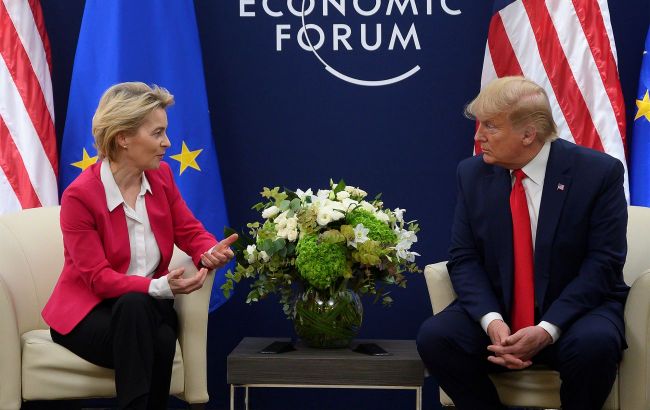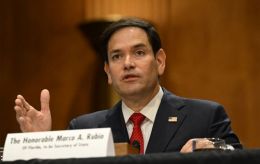Double blow to Russia's energy sector: EU and US preparing new measures
 EC President Ursula von der Leyen and US President Donald Trump (photo: Getty Images)
EC President Ursula von der Leyen and US President Donald Trump (photo: Getty Images)
The European Union and the United States intend to step up their efforts to reduce the consumption of Russian fossil fuels in the EU and around the world soon. What steps have already been taken in this direction and what is planned read in the RBC-Ukraine's article.
Contents
In a few weeks or even earlier, the European Commission is going to present a plan to stop using Russian energy. The EU has already virtually stopped using coal and oil from Russia. As for oil, only Hungary, Slovakia, and Czechia remain exceptions. These countries continue to receive it through the southern branch of the Druzhba pipeline via Ukraine.
Natural gas supplies from Russia to the EU have significantly decreased after its transit through Ukraine was stopped. Currently, the pipeline can only supply gas from Russia via the Balkan Stream from the Turkish Stream - up to 15 billion cubic meters for Romania, Greece, North Macedonia, Serbia, Bosnia and Herzegovina, and Hungary.
Liquefied natural gas (LNG) continues to flow from Russia to the EU. Moreover, according to The Guardian, its imports have reached a record level. Last year, supplies increased by 2 million tons to 17.8 million tons. After regasification, this amounted to almost 25 billion cubic meters.
The decisive factor for increasing supplies is the price. Russian LNG is cheaper. Thus, Russia has overtaken Qatar to become the second-largest supplier of LNG to Europe after the United States.
European Commission spokesperson Anna-Kaisa Itkonen said recently that Russian gas was still present on the EU market, that this was something they would not like to see, and that it was certainly one of the issues that would be addressed in the plan to be presented in the coming weeks.
Russian LNG may not be subject to sanctions
The details of the plan are still unknown. There is also no confirmation that Russian LNG will be included in the 16th sanctions package, which was planned to be adopted by February 24, the date of Russia's large-scale invasion of Ukraine. According to the agency's sources, the EC is working on 2 options. The first is the introduction of sanctions, the second is a plan to reduce the use of LNG.
“In general, the discussion on refusal from Russian liquefied natural gas is progressing. There are fewer and fewer voices against it, but it is still unclear how exactly it will be done. The 16th package of sanctions does not include LNG yet - perhaps the European Commission is thinking of deciding a different way (the refusal plan - ed.). So, I hope the issue will be resolved, but a little later,” Vladyslav Vlasiuk, the Presidential Commissioner for Sanctions Policy, told RBC-Ukraine.
So far, 10 countries have publicly supported the ban on Russian gas, both pipeline and liquefied, in the EU. Among them, there are no countries interested in continuing supplies, including Hungary, Slovakia, Austria, Italy, and Germany.
By the way, while so far only the Slovak leadership has made loud statements threatening Ukraine because of the transit shutdown, the Hungarian prime minister has recently expressed his dissatisfaction. Viktor Orbán has promised to fight back against Ukraine for stopping transit but did not specify what exactly this means. However, the position of these two countries may block the introduction of new sanctions.
A source familiar with the situation suggested that Brussels does not want to rush into a decision now, so as not to create the impression that the EU is dependent on the decisions of Donald Trump, who has already announced his intention to increase LNG supplies to Europe. “If the decision is made quickly, it will mean becoming dependent on LNG supplies from the United States. But the EC wants to work in this direction in the form of an equal partnership,” the source said.
Trump's ultimatum for EU
Given Trump's recent rather harsh, in fact, ultimatum statements, Europe's caution is justified. The new US president has already stated that the EU will either increase its purchases of oil and gas or face higher import tariffs. Trump said after his inauguration that the only thing the EU could do quickly was to buy their oil and gas and that they would fix it with tariffs, or the EU would have to buy their oil and gas. The EU had already stated that it was ready for a dialogue.
Given these statements, it can be assumed that the final decision on restrictions on LNG from Russia will be delayed, and Brussels will have to discuss this issue further with Washington.
The United States intends to increase oil and gas production and supplies, including to Europe. “Drill, baby, drill” is the slogan of Donald Trump's new energy policy, which aims to increase oil and gas supplies not only to the EU but also to other regions, including those dominated by Russian energy carriers. Trump has already reversed his predecessor's decision to ban new offshore oil and gas development.
How soon the result will be
The effect of the first statements and decisions of the new head of the White House came almost instantly. India, which is the largest buyer of Russian oil, said it was ready to increase its purchases of oil and gas from the United States. “There is a possibility of more energy purchases between India and the US. More US energy coming into the market is welcome,” said Indian Oil Minister Hardeep Singh Puri.
Increasing production is not as easy and quick as making a statement about it, says Hennadii Riabtsev, director of the Psychea Center. In his opinion, there will be no real changes soon.
“For example, even after the decree banning the drilling of new wells on the coast and federal lands is canceled, production will not immediately increase. In addition, the construction of liquefied natural gas terminals on the Atlantic coast will need to be unblocked, and this will take time and money. And I want to draw attention to the fact that this project, these promises of Trump's for the four years of his presidency. So I would not expect a significant effect soon,” Riabtsev said in a commentary to the agency.
However, if the displacement of Russian energy resources continues at an increasing pace, the negative effect on Russia's economy will increase significantly. If LNG supplies to the European Union are cut off, Russia could lose up to €7.3 billion a year, which is the amount of revenue Moscow received from the sale of liquefied natural gas to the EU in 2024.

